The Door Jam is a place to squeeze in articles about C.S. Lewis and J.R.R. Tolkien, their work, adaptations of their fantasy worlds, news from other franchises, and interesting articles. Unless otherwise stated, I’m not endorsing (or criticizing) any of these but merely sharing them with you.
I often speak about Lewis’ continued relevancy today, but I had no idea that he would somehow be a part of the current conflict in the Middle East.

Last week, Israel carried out a strike on Iran’s top nuclear scientists with a supposedly secret weapon. All nine were killed simultaneously while sleeping in their own beds, according to the Jerusalem Post. But what makes this strike relevant to this newsletter is the name of the offensive: “Operation Narnia.”
The Post says the name “reflects the operation’s improbable nature, like something out of a fantasy tale rather than a real-world event.” One could also imagine it involved deep espionage tactics that may have had soldiers sneaking in areas as if through a magical wardrobe.
I don’t want to pointlessly opine on what Lewis would think about the modern-day geopolitical situations in the Middle East. But as we’re talking about war, it would be worth reflecting a bit on what Lewis said on that general topic.
Though he fought in World War I, he didn’t discuss it often. You won’t find much about his time on the frontlines in Surprised by Joy. He did worry he would be pulled into war again. In a 1939 letter, he wrote:
My memories of the last war haunted my dreams for years. Military service, to be plain, includes the threat of every temporal evil; pain and death, which is what we fear from sickness; isolation from those we love, which is what we fear from exile; toil under arbitrary masters injustice and humiliation, which is what we fear from slavery: hunger, thirst, and exposure which is what we fear from poverty. I'm not a pacifist. If it's got to be, it's got to be. But the flesh is weak and selfish, and I think death would be much better than to live through another war.
He did live through World War II, but Lewis didn’t serve in active duty again. And his observations about life during periods of national and international chaos are some that remain relevant to us.
I’ve seen many well-meaning people bring up the latest global tragedy or all of them together and express dismay at anyone who is not living in a constant state of fear or agitation.
In his famous speech, “Learning in War-Time,” reprinted in The Weight of Glory, Lewis noted that war time or any other peculiar moment that causes us to be aware of our mortality and the mortality of others is not an “absolutely new situation: it simply aggravates the permanent human situation so that we can no longer ignore it. Human life has always been lived on the edge of a precipice.” He continued:
We are mistaken when we compare war to “normal life.” Life has never been normal. Even those periods we think most tranquil, like the nineteenth century, turn out on closer inspection to be full of crises, alarms, difficulties, emergencies. Plausible reasons have never been lacking for putting off all merely cultural activities until some imminent danger has been averted or some crying injustice put right. But humanity long ago chose to neglect those plausible reasons. They propound theorems in beleaguered cities, conduct metaphysical arguments in condemned cells, make jokes on scaffolds, discuss poetry while advancing on the walls of Quebec, and comb their hair at Thermopylae. This is not panache; it is our nature.
Moments of struggle, even of death, should not cause us to stop learning, growing, living. They should remind us of the importance of doing all that we can while we can in this fallen world.
If we thought we were building up a heaven on earth, if we looked for something that would turn the present world from a place of pilgrimage into a permanent city satisfying the soul, we are disillusioned, and not a moment too soon. But if we thought that for some souls at some times, the life of learning was in its own small way one of the appointed approaches to the divine reality and the divine beauty which we hope to enjoy hereafter, we can think so still.
Sources:
Not Safe But Good
C.S. Lewis quote of the week
The great thing, if one can, is to stop regarding all the unpleasant things as interruptions of one’s ‘own,’ or ‘real’ life. The truth is of course that what one calls the interruptions are precisely one’s real life—the life God is sending one day by day: what one calls one’s ‘real life’ is a phantom of one’s own imagination.
Dec. 20, 1943 letter to Arthur Greeves, The Collected Letters of C.S. Lewis: Vol. 2
Tumnus’ bookshelf
More books by or about Lewis or Tolkien
This one volume collection includes 11 of Lewis’ most well-known and beloved works, including: Mere Christianity, The Screwtape Letters, The Great Divorce, The Problem of Pain, Miracles, A Grief Observed, The Abolition of Man, The Four Loves, Reflections on the Psalms, Surprised by Joy, and Letters to Malcolm. The ebook is normally $89.99, but it’s on sale for $8.99 (-90%)
Other books on sale:
Narrative Poems (ebook) by C.S. Lewis — $1.99 (-84%)
The Personal Heresy: A Controversy (ebook) by C.S. Lewis and E.M.W. Tillyard — $1.99 (-85%)
The Screwtape Letters (paperback) by C.S. Lewis — $9.64 (-46%)
The C. S. Lewis Signature Classics 8-Volume Box Set (paperback) — $64.59 (-57%)
Bilbo's Last Song (hardcover) by J.R.R. Tolkien and illustrated by Pauline Baynes — $10.89 (36%)
The Silmarillion: Tolkien illustrated edition (hardcover) by J.R.R. Tolkien — $39.78 (-47%)
Behind the Wardrobe
Sneak peek at the bonus articles
Below, paid subscribers can read multiple pieces interacting with Lewis’ thought and writing, including his influence on literature, an unexpected letter from him weeks before his death, chivalry, and free speech. Other articles featured include a newly discovered creature from the time of the dinosaurs named after a Tolkien villain, a funny insight into the filming of one of the most memorable moments from The Fellowship of the Ring, more Bible series coming to Prime Video, a possible return to 2D hand-drawn animation for Disney, and more.
Keep reading with a 7-day free trial
Subscribe to The Wardrobe Door to keep reading this post and get 7 days of free access to the full post archives.





